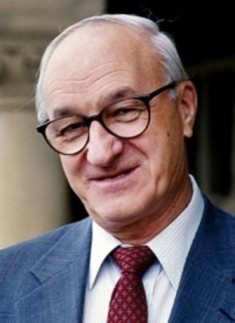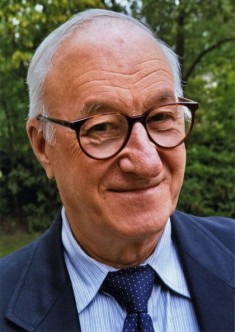| Albert Bandura | |
|---|---|
 |
|
| Psychologist | |
| Born | Dec. 4, 1925 Mundare, Alberta |
| Nationality | Canadian-American |
Albert Bandura is a modern Canadian–born psychologist specializing in educational psychology and developmental psychology. Much of Bandura’s work centers on theory of social learning. He has written about mass communication, escaping homelessness, and even terrorism. He is amongst the most popular psychologists of all time.
Early Years
Albert Bandura was born on December 4, 1925, in a small Canadian town called Mundare, which is located near Edmonton. Albert was the youngest of six children, two of which passed on in youth, one from a hunting accident and another one from the influenza pandemic. His parents were very hardworking and self-educated. They instilled in their children a joy for celebrating life as well as the significance of education.
Educational Years
Albert’s early educational years were comprised of a small school with just two teachers. According to him, because of limited access to educational facilities, the students had no option other than to take charge of their education. Albert saw this as a great opportunity since he was forced to depend on his own curiosity as well as the world around him to grab the concepts that would later serve to further his knowledge.
After enrolling at the University of British Columbia, Albert became fascinated by psychology. He started as a biological science major and his interest in psychology formed by chance. At the age of 25, he earned his B.A. degree.
In 1952, he acquired his Ph.D. from the University of Iowa. Upon graduation, Albert did a clinical internship at Wichita Kansas Guidance Center. The University of Iowa had been home to Clark Hull as well as other psychologists such as Kurt Lewin and Kenneth Spence. While he was at the university, he developed his social learning theory.
He strongly believed that psychologists have to “conceptualize clinical phenomena in a way that would make them agreeable to experimental tests.” Also, he strongly believed that psychological research ought to be conducted in the lab in order to manage factors that determined behavior.
Career Highlights
After obtaining his Ph.D., Albert was offered a job at Stanford University. He accepted the offer though it meant rejecting another job he had already been offered. He has continued to work at Standford to date. It was during the studies on adolescent aggression that his interest in vicarious learning as well as modeling grew.
Contributions to Psychology
One of Albert Bandura’s popular works is the Bobo doll experiment in the 1950s. In his experiment, he presented kids with social models of violent behavior or non-violent behavior towards a Bobo doll. The kids who witnessed the violent behavior turned violent towards the doll. The control group was not violent towards the doll.
Albert and his colleagues – Sheila Ross and Dorrie – showed that social modeling is an effectual way of learning. Albert went on to include social modeling into his views on the theory of social learning which had a great impact on psychology in 1980s.
Is Bandura a Behaviorist?
Although a number of psychology books have placed Albert’s theory with those of behaviorists, he himself has stated that he does not fit into the behavioral orthodoxy. He even argued in his early work that minimizing behavior to the stimulus-response cycle was very simplistic. Though Albert’s work has used behavioral terminologies, such as ‘reinforcement’ and ‘conditioning,’ he believes that he is not a behaviorist.
Recognition and Publications
 Albert Bandura has received many awards, including the Distinguished Scientific Contributions Award, the William James Award of the American Psychological Society, the Thorndike Award for Distinguished Contributions of Psychology to Education, as well as the James McKeen Cattell Award. His research on modeling behavior of children, social cognitive theory, and self-efficacy made him a popular researcher.
Albert Bandura has received many awards, including the Distinguished Scientific Contributions Award, the William James Award of the American Psychological Society, the Thorndike Award for Distinguished Contributions of Psychology to Education, as well as the James McKeen Cattell Award. His research on modeling behavior of children, social cognitive theory, and self-efficacy made him a popular researcher.
He has also written many articles and books that have been utilized in psychological research. His books have been translated in various languages, including Italian, Spanish, Polish, Portuguese, French, German, Chinese, Russian, Korean and Japanese. He is amongst the most prominent figures in contemporary psychology, and he is listed fourth behind B.F Skinner, Freud, and Piaget.
Personal Life
Albert and his wife, Virginia, have been together for 61 years and they have two daughters. Albert is fond of spending his time with his family. He also takes pleasure in travelling and hiking. He enjoys dining at different eateries and drinking a bottle of wine from time to time.